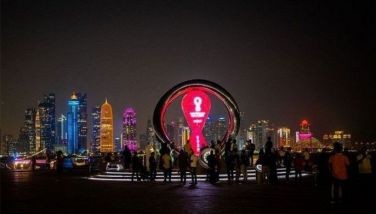Globe cites case in which a monopoly may grow bigger
Manila, Philippines - Ayala-owned Globe Telecom said that a monopoly may, to a certain extent, be allowed to grow bigger but only organically, and not by gobbling up the competition.
Globe participated in the 11th Fidel V. Ramos Peace and Development Foundation Inc. (RPDEV) Lecture Series as part of its advocacy on free market competition and level playing field to protect the interest of consumers.
Globe chief legal counsel lawyer Rodolfo Salalima presented a case study on the telecommunications industry using the story of Globe and how the company changed the telecom landscape coming from the dark ages of the monopoly.
Salalima quoted Supreme Court Justice Antonio Carpio, then executive secretary of President Ramos and the force behind the liberalization scheme in telecommunication, who shared a story on the brutal impact of telecom monopoly back in the days. According to Carpio, “Back in 1992, it took three to 15 years to get a telephone line in Metro Manila. In the provinces, most people did not even expect to get a telephone subscription in their lifetime. The problem was that the telephone industry was a monopoly. This resulted in the inefficiency of telecommunication services by which the telephone monopoly had become the problem, and no longer the solution.”
After President Ramos signed the executive order mandating telephone monopoly to interconnect with new cellular phone companies, new telecom firms entered the market to provide customers an alternative way of communicating with each other. In 1994, Globe started to commercially offer mobile cellular services to Filipinos and has now grown to become a full service telecom company serving the needs of more than 27 million mobile, broadband, and ICT customers.
With the entry of Globe and other cellular firms, the telecommunications industry underwent a major revolution that ultimately transformed the way people communicate – easy, flexible and hassle-free. At the forefront of innovation, Globe brought text services and the use of digital network to the country. It was also the first to introduce customizable plans and the latest 4G technology in the Philippines.
In his speech, Salalima also cited added benefits of free competition in the market.
According to him, the telecom diversity has pushed companies to be flexible on call and text fees, which enable customers to have a free rein which network to subscribe to depending on their spending capacities. “Phone lines which took years to secure from the dominant carrier can now be made available in a matter of minutes,” Salalima added.
Globe said it is joined by several consumer groups and consumer rights advocates in its battle against telecom monopoly brought about by the impending merger of PLDT and Digitel. “Globe takes the position that a monopoly may, to a certain extent, be allowed to grow bigger but only organically, and not by gobbling up the competition. Because doing so places consumer welfare at risk. The dark ages of the old monopoly must never return,” Salalima said.
The Ramos Peace and Development Foundation, Inc. (RPDEV) is a non-partisan, nonprofit, non-stock organization dedicated to the promotion of peace and development in the Philippines and in the larger Asia-Pacific region. RPDEV supports Philippine national interests and people empowerment. Operating as a network of individuals and institutions inside and outside the country, it will serve as a catalyst of constructive change, a medium for fostering unity, stability and progress, and a force for mutual understanding.
Under Ramos, Republic Act 7925 or the New Telecoms Policy Act was passed in 1995. Under R.A. 7925, the telecom industry in the country is meant to be de-monopolized and liberalized by allowing more players to enter and compete in the telecoms service under the spirit of deregulation or less stringent regulations.
Meanwhile, Globe took a stab at PLDT for again baring its monopolistic arrogance when it tried to bar the entry of Globe services from the Bonifacio Global City.
Salalima pointed out that PLDT used an agreement it had with the Fort Bonifacio Development Corp. (FBDC), overseer of the master planning for the Bonifacio Global City, back in 2002 that it would be the area’s exclusive telecommunications and data provider in exchange for the company purchasing a 75 percent stake in the Bonifacio Communications Corp, a firm mandated to provide telecommunications infrastructure and related services within BGC. PLDT’s affiliate, Metro Pacific Corp., also owned a stake in the Bonifacio Land Development Corporation, the holding company for BGC, which it subsequently sold in 2003.
Globe brought the case before the National Telecommunications Commission (NTC) as it could not set-up its own IT hub in what is now its parent company’s territory because of the said exclusivity arrangement that PLDT and Smart had made for BGC. The NTC released Memorandum Circular (MC) 05-05-2002, which stated that information technology/business process outsourcing (IT/BPO) hubs such as BGC and Eastwood in Quezon City are designated telco-free zones. In these free zones, any duly-enfranchised public telecommunications company can set up and provide high-speed information networks. The NTC Memorandum Circular was also backed by a subsequent legal opinion from the Department of Justice.
PLDT sued the NTC and Globe before the Quezon City Regional Trial Court on the argument that “exclusivity is an industry practice and is not an abnormality.” Both the NTC and the QC RTC ruled against PLDT, with the former pointing to it as a grave violation of its mandate to promote non-discriminatory universal access to telecommunications facilities. Just the same, PLDT still elevated the case to the Court of Appeals in January 2011.
On April 25, 2011, Globe, through unit Innove Communications, filed its comment on the case filed by PLDT that seeks to ban all Globe services from the Bonifacio Global City before the Court of Appeals’ Tenth Division. In its comment, Globe argued that it is in the public’s best interest that open access and free competition among telcos be allowed at the Bonifacio Global City. It asked the Appellate Court to dismiss PLDT’s case for lack of merit.
Salalima added that PLDT’s intransigence in this BGC entry barrier case and in other issues like the excessive holdings in frequencies and the refusal to interconnect faces an uphill climb. There is a growing broad sectoral appeal for compliance with the Constitutional provision shunning monopolies that are a threat to public interest and free competition. Consumer groups and various people organizations are calling for a new anti-trust bill to add more teeth to the enforcement of Constitutional provisions against monopolies and cartels.
Globe had called on regulators to arrest the impact of the impending merger of PLDT and Digitel, which could turn into a virtual telco monopoly when it eventually controls 70 percent of the market and more than majority of spectrum frequencies assigned by the NTC.
- Latest
- Trending





























